AWM41 1072 - [Official History, 1914-18 War: Records of Arthur G Butler:] Interviews containing accounts of Nursing experiences in the AANS [Australian Army Nursing Service]. These nurses were interviewed by Matron Kellett - Part 16
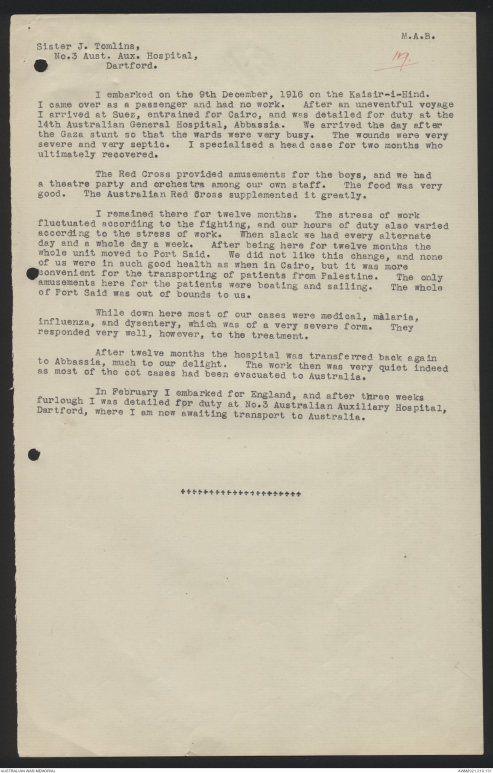
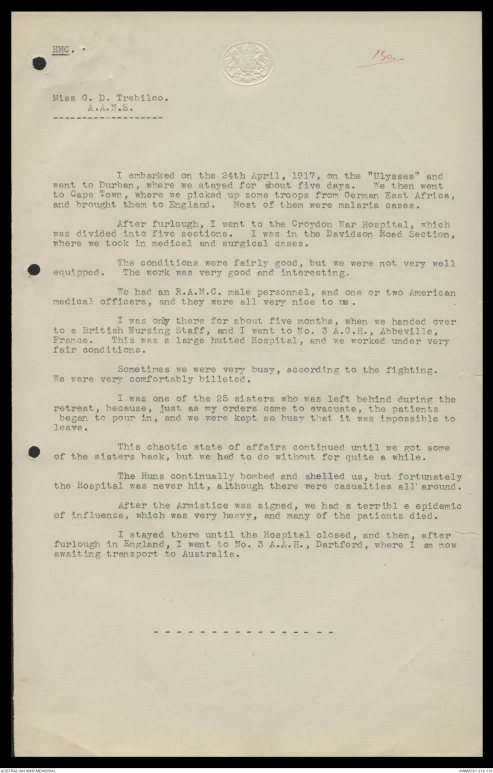
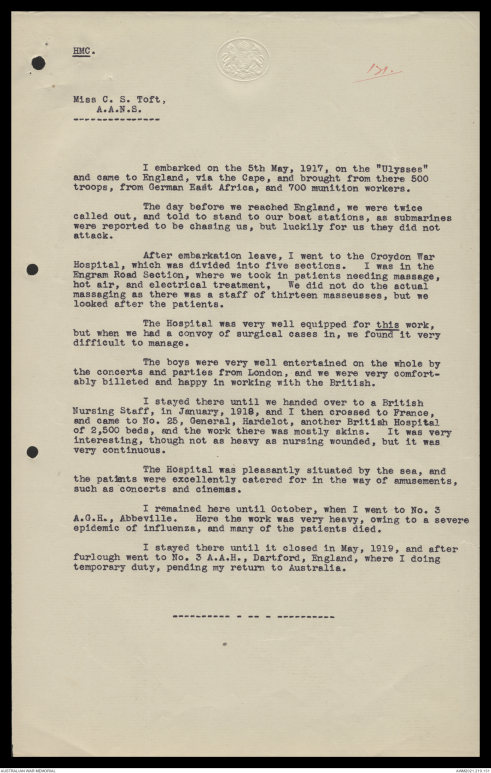
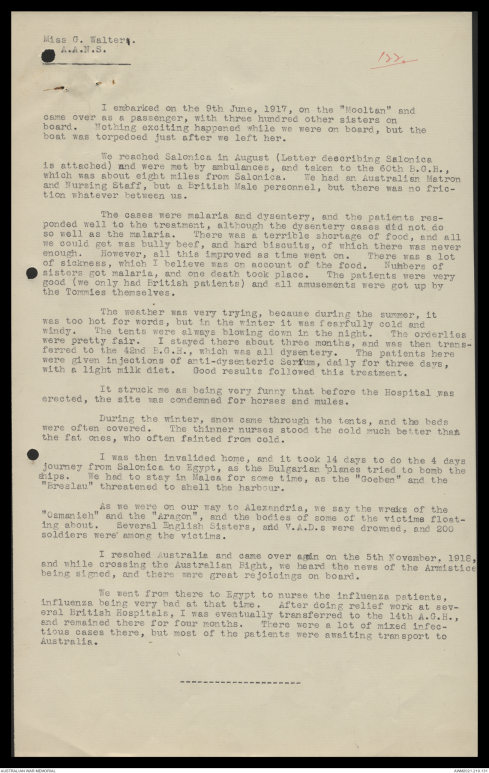
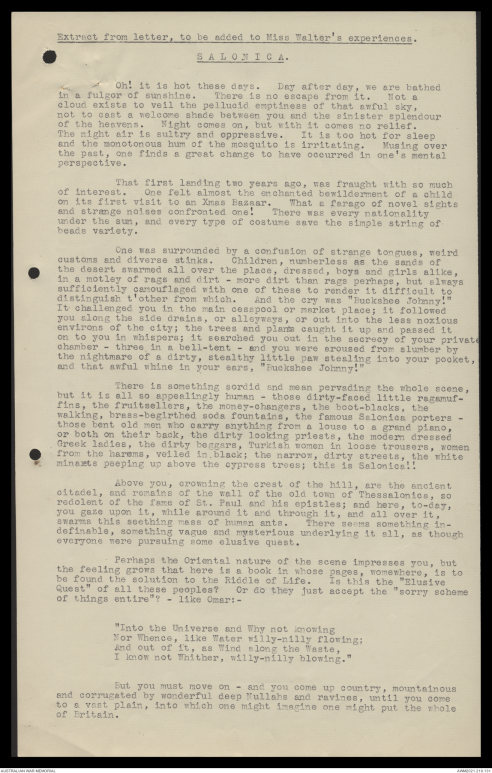
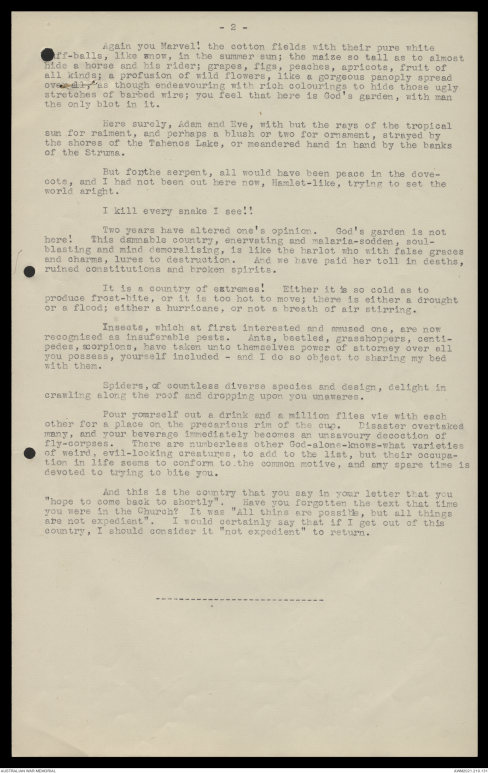
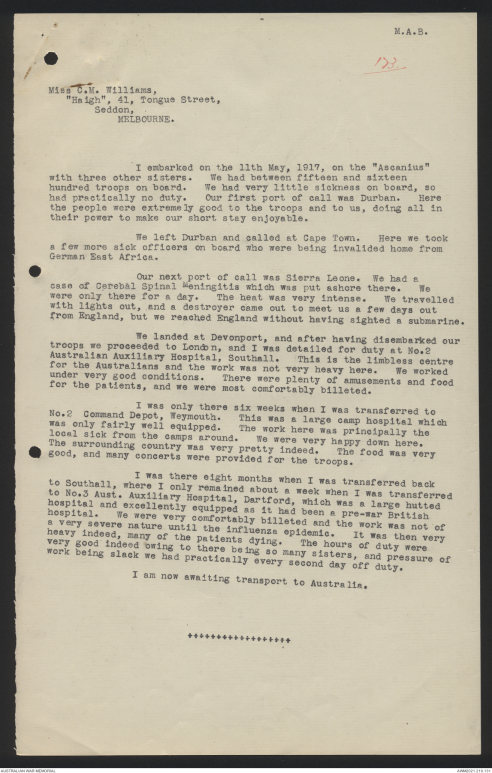
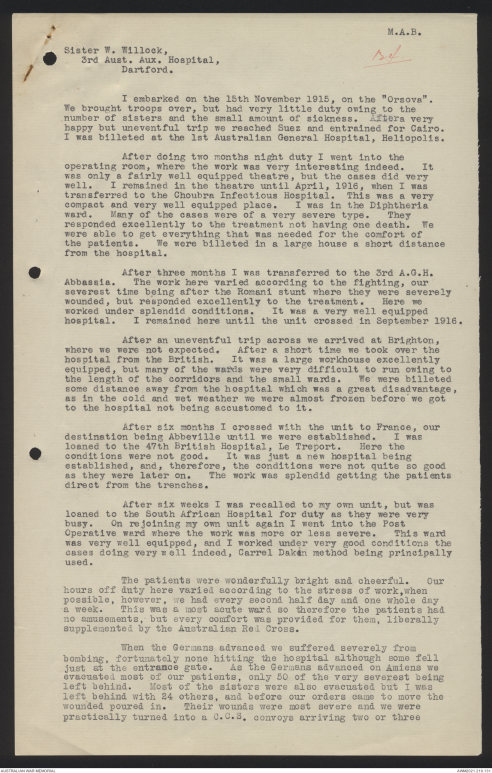
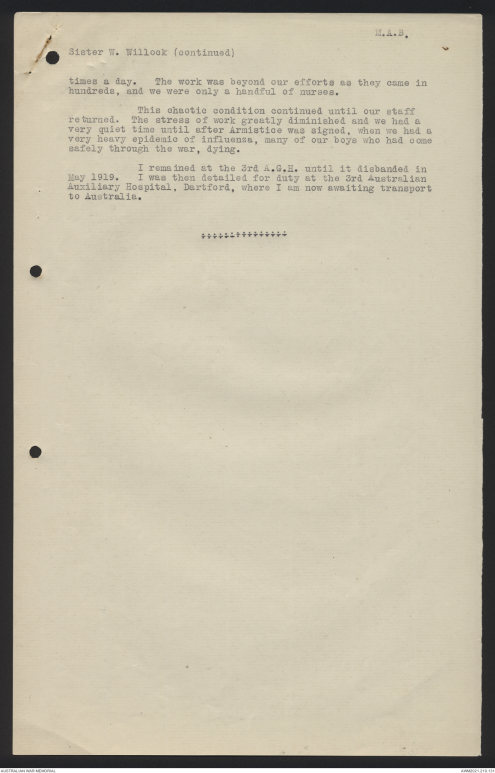
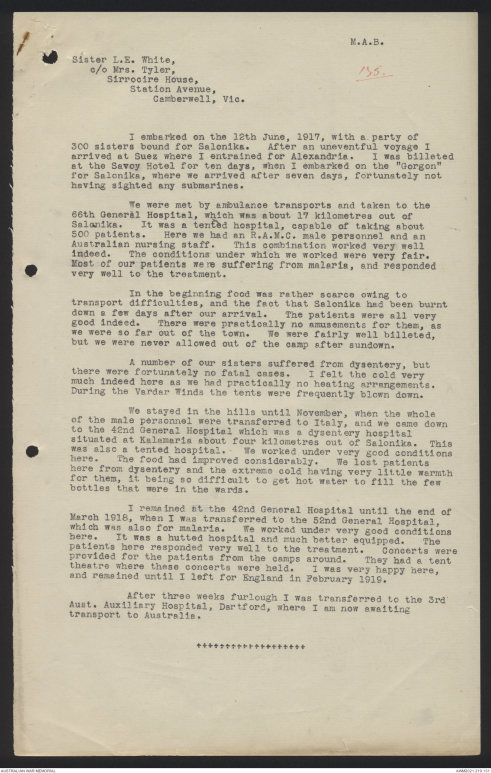
M.A.B.
119
Sister J. Tomlins,
No.3 Aust. Aux. Hospital,
Dartford.
I embarked on the 9th December, 1916 on the Kaisir-i-Hind.
I came over as a passenger and had no work. After an uneventful voyage
I arrived at Suez, entrained for Cairo, and was detailed for duty at the
14th Australian General Hospital, Abbassia. We arrived the day after
the Gaza stunt so that the wards were very busy. The wounds were very
severe and very septic. I specialised a head case for two months who
ultimately recovered.
The Red Cross provided amusements for the boys, and we had
a theatre party and orchestra among our own staff. The food was very
good. The Australian Red Cross supplemented it greatly.
I remained there for twelve months. The stress of work
fluctuated according to the fighting, and our hours of duty also varied
according to the stress of work. When slack we had every alternate
day and a whole day a week. After being here for twelve months the
whole unit moved to Port Said. We did not like this change, and none
of us were in such good health as when in Cairo, but it was more
convenient for the transporting of patients from Palestine. The only
amusements here for the patients were boating and sailing. The whole
of Port Said was out of bounds to us.
While down here most of our cases were medical, malaria,
influenza, and dysentery, which was of a very severe form. They
responded very well, however, to the treatment.
After twelve months the hospital was transferred back again
to Abbassia, much to our delight. The work then was very quiet indeed
as most of the cot cases had been evacuated to Australia.
In February I embarked for England, and after three weeks
furlough I was detailed for duty at No.3 Australian Auxiliary Hospital,
Dartford, where I am now awaiting transport to Australia.
HMC.
130.
Miss G. D. Trebilco.
A.A.N.S.
I embarked on the 24th April, 1917, on the "Ulysses" and
went to Durban, where we stayed for about five days. We then went
to Cape Town, where we picked up some troops from German East Africa,
and brought them to England. Most of them were malaria cases.
After furlough, I went to the Croydon War Hospital, which
was divided into five sections. I was in the Davidson Road Section,
where we took in medical and surgical cases.
The conditions were fairly good, but we were not very well
equipped. The work was very good and interesting.
We had an R.A.M.C. male personnel, and one or two American
medical officers, and they were all very nice to us.
I was only there for about five months, when we handed over
to a British Nursing Staff, and I went to No. 3 A.G.H., Abbeville,
France. This was a large hutted Hospital, and we worked under very
fair conditions.
Sometimes we were very busy, according to the fighting.
We were very comfortably billeted.
I was one of the 25 sisters who was left behind during the
retreat, because, just as my orders came to evacuate, the patients
began to pour in, and we were kept so busy that it was impossible to
leave.
This chaotic state of affairs continued until we got some
of the sisters back, but we had to do without for quite a while.
The Huns continually bombed and shelled us, but fortunately
the Hospital was never hit, although there were casualties all around.
After the Armistice was signed, we had a terribl e epidemic
of influenza, which was very heavy, and many of the patients died.
I stayed there until the Hospital closed, and then, after
furlough in England, I went to No. 3 A.A.H., Dartford, where I am now
awaiting transport to Australia.
HMC.
121
Miss C.S. Toft,
A.A.N.S.
I embarked on the 5th May, 1917, on the "Ulysses"
and came to England, via the Cape, and brought from there 500
troops, from German East Africa, and 700 munition workers.
The day before we reached England, we were twice
called out, and told to stand to our boat stations, as submarines
were reported to be chasing us, but luckily for us they did not
attack.
After embarkation leave, I went to the Croydon War
Hospital, which was divided into five sections. I was in the
Engram Road Section, where we took in patients needing massage,
hot air, and electrical treatment. We did not do the actual
massaging as there was a staff of thirteen masseusses, but we
looked after the patients.
The Hospital was very well equipped for this work,
but when we had a convoy of surgical cases in, we found it very
difficult to manage.
The boys were very well entertained on the whole by
the concerts and parties from London, and we were very
comfortably billeted and happy in working with the British.
I stayed there until we handed over to a British
Nursing Staff, in January, 1918, and I then crossed to France,
and came to No. 25, General, Hardelot, another British Hospital
of 2,500 beds, and the work there was mostly skins. It was very
interesting, though not as heavy as nursing wounded, but it was
very continuous.
The Hospital was pleasantly situated by the sea, and
the patients were excellently catered for in the way of amusements,
such as concerts and cinemas.
I remained here until October, when I went to No. 3
A.G.H., Abbeville. Here the work was very heavy, owing to a severe
epidemic of influenza, and many of the patients died.
I stayed there until it closed in May, 1919, and after
furlough went to No. 3 A.A.H., Dartford, England, where I doing
temporary duty, pending my return to Australia.
122
Miss G. Walters.
A.A.N.S.
I embarked on the 9th June, 1917, on the "Mooltan" and
came over as a passenger, with three hundred other sisters on
board. Nothing exciting happened while we were on board, but the
boat was torpedoed just after we left her.
We reached Salonica in August (Letter describing Salonica
is attached) and were met by ambulances, and taken to the 60th B.G.H.,
which was about eight miles from Salonica. We had an Australian Matron
and Nursing Staff, but a British Male personnel, but there was no friction
whatever between us.
The cases were malaria and dysentery, and the patients responded
well to the treatment, although the dysentery cases did not do
so well as the malaria. There was a terrible shortage of food, and all
we could get was bully beef, and hard biscuits, of which there was never
enough. However, all this improved as time went on. There was a lot
of sickness, which I believe was on account of the food. Numbers of
sisters got malaria, and one death took place. The patients were very
good (we only had British patients) and all amusements were got up by
the Tommies themselves.
The weather was every trying, because during the summer, it
was too hot for words, but in the winter it was fearfully cold and
windy. The tents were always blowing down in the night. The orderlies
were pretty fair. I stayed there about three months, and was then
transferred to the 42nd B.G.H., which was all dysentery. The patients here
were given injections of anti-dysenteric Serium, daily for three days,
with a light milk diet. Good results followed this treatment.
It struck me as being very funny that before the Hospital was
erected, the site was condemned for horses and mules.
During the winter, snow came through the tents, and the beds
were often covered. The thinner nurses stood the cold much better than
the fat ones, who often fainted from cold.
I was then invalided home, and it took 14 days to do the 4 days
journey from Salonica to Egypt, as the Bulgarian planes tried to bomb the
ships. We had to stay in Malea for some time, as the "Goeben" and the
"Breslan" threatened to shell the harbour.
As we were on our way to Alexandria, we say the wrecks of the
"Oamanich" and the "Aragon", and the bodies of some of the victims
floating about. Several English Sisters, and V.A.D.s were drowned, and 200
soldiers were among the victims.
I reached Australia and came over again on the 5th November, 1918,
and while crossing the Australian Bight, we heard the news of the Armistice
being signed, and there were great rejoicings on board.
We went from there to Egypt to nurse the influenza patients,
influenza being very bad at that time. After doing relief work at
several British Hospitals, I was eventually transferred to the 14th A.G.H.,
and remained there for four months. There were a lot of mixed infectious
cases there, but most of the patients were awaiting transport to
Australia.
Extract from letter, to be added to Miss Walter's experiences.
SALONICA.
Oh! it is hot these days. Day after day, we are bathed
in a fulgor of sunshine. There is no escape from it. Not a
cloud exists to veil the pellucid emptiness of that awful sky,
not to case a welcome shade between you and the sinister splendour
of the heavens. Night comes on, but with it comes no relief.
The night air is sultry and oppressive. It is too hot for sleep
and the monotonous hum of the mosquito is irritating. Musing over
the past, one finds a great change to have occurred in one's mental
perspective.
That first landing two years ago, was fraught with so much
of interest. One felt almost the enchanted bewilderment of a child
on its first visit to an Xmas Bazaar. What a farago of novel sights
and strange noises confronted one! there was every nationality
under the sun, and every type of costume save the simple string of
beads variety.
One was surrounded by a confusion of strange tongues, weird
customs and diverse stinks. Children, numberless as the sands of
the desert swarmed all over the place, dressed, boys and girls alike,
in a motley of rags and dirt - more dirt than rags perhaps, but always
sufficiently camouflaged with one of these to render it difficult to
distinguish t' other from which. And the cry was "Buckshee Johnny!"
It challenged you in the main cesspool or market place; it followed
you along the side drains, or alleyways, or out into the less noxious
environs of the city: the trees and plants caught it up and passed it
on to you in whispers; it searched you out in the secrecy of your private
chamber- three in a bell-tent - and you were aroused from slumber by
the nightmare of a dirty, stealthy little paw stealing into your pocket,
and that awful whine in your ears, " Buckshee Johnny!"
There is something sordid and mean pervading the whole scene,
but it is all so appealingly human - those dirty-faced little ragamuffins,
the fruitsellers, the money-changers, the boot-blacks, the
walking, brass-begirthed soda fountains, the famous Salonica porters -
those bent old men who carry anything from a louse to a grand piano,
or both on their back, the dirty looking priests, the modern dressed
Greek ladies, the dirty beggars, Turkish women in loose trousers, women
from the harems, veiled in black; the narrow, dirty streets, the white
minarets peeping up above the cypress trees; this is Salonica!!
Above you, crowning the crest of the hill , are the ancient
citadel, and remains of the wall of the old town of Thessalonica, so
redolent of the fame of St. Paul and his epistles; and here, to-day,
you gaze upon it, while around it and through it, and all over it,
swarms this seething mass of human ants. There seems something
indefinable, something vague and mysterious underlying it all, as though
everyone were pursuing some elusive quest.
Perhaps the Oriental nature of the scene impresses you, but
the feeling grows that here is a book in whose pages, womewhere, is to
be found the solution to the Riddle of Life. Is this the "Elusive
Quest" of all these peoples? Or do they just accept the "sorry scheme
of things entire"? - like Omari : -
"Into the Universe and Why not knowing
Nor Whence, like Water willy-nilly flowing;
And out of it, as Wind along the Waste,
I know not Whither, willy-nilly blowing."
But you must move on - and you come up country, mountainous
and corrugated by wonderful deep Nullahs and ravines, until you come
to a vast plain, into which one might imagine one might put the whole
of Britain.
- 2 -
Again you Marvel! the cotton fields with their pure white
puff-balls, likes snow, in the summer sun; the maize so tall as to almost
hide a horse and his rider; grapes, figs, peaches, apricots, fruit of
all kinds a profusion of wild flowers, like a gorgeous panoply spread
over all as though endeavouring with rich colourings to hide those ugly
stretches of barbed wire; you feel that here is God's garden, with man
the only blot in it.
Here surely, Adam and Eve, with but the rays of the tropical
sun for raiment, and perhaps a blush or two for ornament, strayed by
the shores of the Tahenos Lake, or meandered hand in hand by the banks
of the Struma.
But for the serpent, all would have been peace in the dovecots,
and I had not been out here now, Hamlet-like, trying to set the
world right.
I kill every snake I see!!
The years have altered one's opinion. God's garden is not
here! This damnable country, enervating and malaria-sodden, soul-
blasting and mind demoralising, is like the harlot who with false graces
and charms, lures to destruction. And we have paid her toll in deaths,
ruined constitutions and broken spirits.
It is a country of extremes! Either it is so cold as to
produce frost-bite, or it is too hot to move; there is either a drought
or a flood; either a hurricane, or not a breath of air stirring.
Insects, which at first interested and amused one, are now
recognised as insuferable pests. Ants, beetles, grasshoppers, centipedes,
scorpions, have taken unto themselves power of attorney over all
you possess, yourself included - and I do so object to sharing my bed
with them.
Spiders, of countless diverse species and design, delight in
crawling along the roof and dropping upon you unawares.
Pour yourself out a drink and a million flies vie with each
other for a place on he precarious rim of the cup. Disaster overtakes
many, and your beverage immediately becomes an unsavoury decoction of
fly-corpses. There are numberless other God-alone-knows-what varieties
of weird, evil-looking creatures, to add to the list, but their occupation
in life seems to conform to the common motive, and any spare time is
devoted o trying to bite you.
And this is the country that you say in your letter that you
"hope to come back to shortly". Have you forgotten the text that time
you were in the Church? It was "All thins are possible, but all things
are not expedient". I would certainly say that if I get out of this
country, I should consider it "Not expedient" to return.
M.A.B.
172
Miss C.M. Williams
"Haigh", 41 Tongue Street,
Seddon,
MELBOURNE.
I embarked on the 11th May, 1917, on the "Ascanius"
with three other sisters. We had between fifteen and sixteen
hundred troops on board. We had very little sickness on board, so
had practically no duty. Our first port of call was Durban. Here
the people were extremely good to the troops and to us, doing all in
their power to make our short stay enjoyable.
We left Durban and called at Cape Town. Here we took
a few more sick officers on board who were being invalided home from
German East Africa.
Our next port of call was Sierra Leone. We had a
case of Cerebal Spinal Meningitis which was put ashore there. We
were only there for a day. The heat was very intense. We travelled
with lights out, and a destroyer came out to meet us a few days out
from England, but we reached England without having sighted a submarine.
We landed at Devonport, and after having disembarked our
troops we proceeded to London, and I was detailed for duty at No.2
Australian Auxiliary Hospital, Southall. This is the limbless centre
for the Australians and the work was not very heave here. We worked
under very good conditions. There were plenty of amusements and food
for the patients, and we were most comfortably billeted.
I was only there six weeks when I was transferred to
No.2 Command Depot, Weymouth. This was a large camp hospital which
was only fairly well equipped. The work here was principally the
local sick from the camps around. We were very happy down here.
The surrounding country was very pretty indeed. The food was very
good, and many concerts were provided for the troops.
I was there eight months when I was transferred back
to Southall, where I only remained about a week when I was transferred
to No.3 Aust. Auxiliary Hospital, Dartford, which was a large hutted
hospital and excellently equipped as it had been a pre-war British
hospital. We were very comfortably billeted and the work was not of
a very severe nature until the influenza epidemic. It was then very
heavy indeed, many of the patients dying. The hours of duty were
very good indeed owing to there being so many sisters, and pressure of
work being slack we had practically every second day off duty.
I am now awaiting transport to Australia.
M.A.B.
134
Sister W. Willock.
3rd Aust. Aux. Hospital,
Dartford.
I embarked on the 15th November 1915, on the "Orsova".
We brought troops over, but had very little duty owing to the
number of sisters and the small amount of sickness. After a very
happy but uneventful trip we reached Suez and entrained for Cairo.
I was billeted at the 1st Australian General Hospital, Heliopolis..
After doing two months night duty I went into the
operating room, where the work was very interesting indeed. It
was only a fairly well equipped theatre, but the cases did very
well. I remained in the theatre until April, 1916, when I was
transferred to the Choubra Infectious Hospital. This was a very
compact and very well equipped place. I was in the Diphtheria
ward. Many of the cases were of a very severe type. They
responded excellently to the treatment not having one death. We
were able to get everything that was needed for the comfort of
the patients. We were billeted in a large house a short distance
from the hospital.
After three months I was transferred to the 3rd A.G.H.
Abbassia. The work here varied according to the fighting, our
severest time being after the Romani stunt where they were severely
wounded, but responded excellently to the treatment. Here we
worked under splendid conditions. It was a very well equipped
hospital. I remained here until the unit crossed in September 1916.
After an uneventful trip across we arrived at Brighton,
where we were not expected. After a short time we took over the
hospital from the British. It was a large workhouse excellently
equipped, but many of the wards were very difficult to run owing to
the length of the corridors and the small wards. We were billeted
some distance away from the hospital which was a great disadvantage,
as in the cold and wet weather we were almost frozen before we got
to the hospital not being accustomed to it.
After six months I crossed with the unit to France, our
destination being Abbeville until we were established. I was
loaned to the 47th British Hospital, Le Treport. Here the
conditions were not good. It was just a new hospital being
established, and, therefore the conditions were not quire so good
as they were later on. The work was splendid getting the patients
direct from the trenches.
After six weeks I was recalled to my own unit, but was
loaned to the South African Hospital for duty as they were very
busy. On rejoining my own unit again I went into the Post
Operative ward where the work was more or less severe. This ward
was very well equipped, and I worked under very good conditions the
cases doing very well indeed, Carrel Daken method being principally
used.
The patients were wonderfully bright and cheerful. Our
hours off duty here varied according to the stress of work, when
possible, however, we had every second half day and one whole day
a week. This was a most acute ward so therefore the patients had
no amusements, but every comfort was provided for them, liberally
supplemented by the Australian Red Cross.
When the Germans advanced we suffered severely from
bombing, fortunately none hitting the hospital although some fell
just at the entrance gate. As the Germans advanced on Amiens we
evacuated most of our patients, only 50 of the severest being
left behind. Most of the sisters were also evacuated but I was
left behind with 24 others, and before our orders came to move the
wounded poured in. Their wounds were most severe and we were
practically turned into a C.C.S. convoys arriving two or three
M.A.B.
Sister W. Willock (continued)
times a day. The work was beyond our efforts as they came in
hundreds, and we were only a handful of nurses.
This chaotic condition continued until our staff
returned. The stress of work greatly diminished and we had a
very quiet time until after Armistice was signed, when we had a
very heavy epidemic of influenza, many of our boys who had come
safely though the war, dying.
I remained at the 3rd A.G.H. until it disbanded in
May 1919. I was then detailed for duty at the 3rd Australian
Auxiliary Hospital, Dartford, where I am now awaiting transport
to Australia.
M.A.B.
135
Sister L.E. White,
c/o Mrs. Tyler,
Sirrocire House,
Station Avenue,
Camberwell, Vic.
I embarked on the 12th June, 1917, with a party of
300 sisters bound for Salonika. After an uneventful voyage I
arrived at Suez where I entrained for Alexandria. I was billeted
at the Savoy Hotel for ten days, when I embarked on the "Gorgon"
for Salonika, where we arrived after seven days, fortunately not
having sighted any submarines.
We were met by ambulance transports and taken to the
66th General Hospital which was about 17 kilometres out of
Salonika. It was a tented hospital, capable of taking about
500 patients. Here we had an R.A.M.C. male personnel and an
Australian nursing staff. This combination worked very well
indeed. The conditions under which we worked were very fair.
Most of our patients were suffering from malaria, and responded
very well to the treatment.
In the beginning food was rather scarce owing to
transport difficulties, and the fact that Salonika had been burnt
down a few days after our arrival. The patients were all very
good indeed. There were practically no amusements for them, as
we were so far out of the town. We were fairly well billeted,
but we were never allowed out of the camp after sundown.
A number of our sisters suffered from dysentery, but
there were fortunately no fatal cases. I felt the cold very
much indeed here as we had practically no heating arrangements.
During the Varder Winds the tents were frequently blown down.
We stayed in the hills until November, when the whole
of the male personnel were transferred to Italy, and we came down
to the 42nd General Hospital which was a dysentery hospital
situated at Kalamaria about four kilometres out of Salonika. This
was also a tented hospital. We worked under very good conditions
here. The food had improved considerably. We lost patients
here from dysentery an the extreme cold having very little warmth
for them, it being so difficult to get hot water to fill the few
bottles that were in the wards.
I remained at the 42nd General Hospital until the end of
March 1918, when I was transferred to the 52nd General Hospital,
which was also for malaria. We worked under very good conditions
here. It was a hutted hospital and much better equipped. Concerts were
provided for the patients from the caps around. They had a tent
theatre where these concerts were held. I was very happy here,
and remained until I left for England in February 1919.
After three weeks furlough I was transferred to the 3rd
Aust. Auxiliary Hospital, Dartford, where I am now awaiting
transport to Australia.
 Sam scott
Sam scottThis transcription item is now locked to you for editing. To release the lock either Save your changes or Cancel.
This lock will be automatically released after 60 minutes of inactivity.